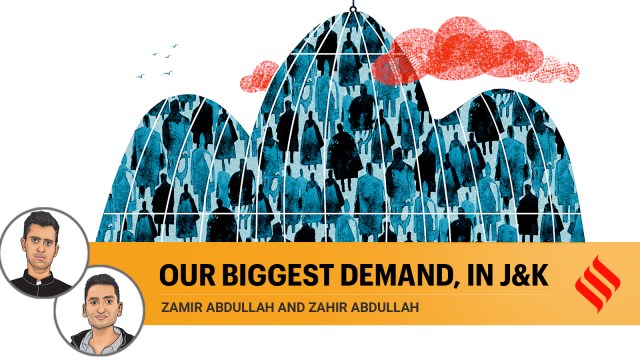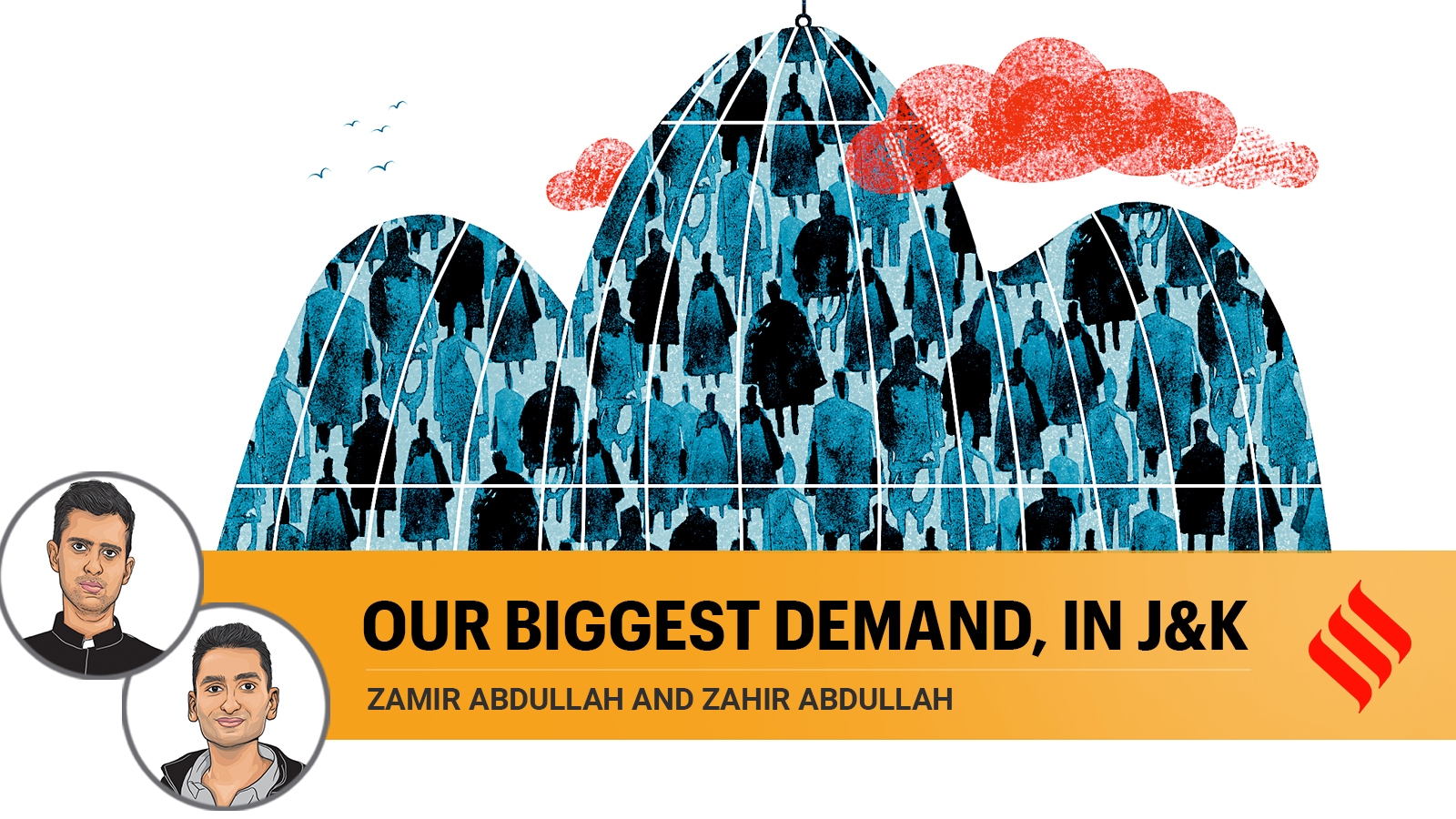
After August 5, 2019, when the Bharatiya Janata Party (BJP) regime undemocratically abrogated Article 370, it did something unprecedented in Indian history: Reducing one of the most empowered states to two separate Union Territories, stripping the region of every semblance of autonomy offered by the much-denuded Article 370. In doing so, it seized all powers and decision-making authority from the hands of the people, consolidating it within the central government. In an attempt to control the narrative around this brazen abuse of power, the Centre suppressed the voices emerging from J&K. It instilled a sense of fear among its people. Where despite their profound anger and dissatisfaction over what was done to them in 2019, they were too afraid to express their dissent.
One of the main instruments used in muzzling dissent has been the Unlawful Activities Prevention Act (UAPA), the draconian anti-terror law. Its sweeping and arbitrary powers made it the perfect tool for the regime to spread a cloud of fear across the region. Following the abrogation of Article 370, the administration began arresting an unprecedented number of individuals—targeting local politicians, journalists, photographers, human rights activists, or anyone who dared speak out on any platform against the administration. UAPA became their weapon of choice, with baseless charges levied against countless individuals. Before 2019, Jammu and Kashmir saw an average of 50 UAPA cases annually. Combining both 2019 and 2020, this number surged dramatically wherein a total of 573 people were arrested under UAPA. By 2022, the number rose to 371, making J&K the region with the highest UAPA arrests in the country. Additionally, the administration also wielded the Public Safety Act (PSA) to further silence the people.
Given the region’s history, the people harbour a deep emotional connection with the incarcerated, seeing them as symbols of resistance against oppression, as those brave voices speaking truth to power. Ironically, in their attempt to quash dissent, the BJP government’s actions post-2019 only intensified this emotional solidarity, fuelling an even stronger sense of affiliation with the incarcerated and galvanising a collective sentiment.
The BJP recognised that the National Conference (NC) was the only party which was vocal in opposing their agenda on J&K and has a history of being the only pro-people party in the region. As the parliamentary campaign began, to the dismay of the BJP, NC appeared to be doing well as opposed to their proxy candidate for the North Kashmir seat. While the BJP’s campaign nationwide was in full swing and the party was desperate to retain power and put on a performance of normalcy, the Home Minister made a surprise visit to Srinagar. Since BJP did not have a single candidate contesting any of the three parliamentary seats in Kashmir, this visit prompted many conjectures. We wondered what had caused such alarm for the Home Minister to leave his critical campaign trail and rush to Srinagar at the time.
Coincidently, the course of the election campaign in North Kashmir changed. Instantaneously, the campaign of Sheikh “Engineer” Rashid—who had been imprisoned since 2019 on charges of terror funding—gained significant momentum. Well aware of the deep emotional connection the people of J&K have with those incarcerated, the BJP saw Rashid’s imprisonment as an opportunity to exploit this sentiment to electorally contain NC in order to maintain their narrative. They gambled on Rashid, hoping that he would siphon enough votes to secure victory for their main proxy candidate. What they hadn’t anticipated, due to this emotion being electorally unquantified, was the extent to which the sentiment would connect with the people whose affections and emotional solidarities with the incarcerated had further intensified since 2019.
In a bid to legitimise the political changes in Kashmir, the party used the collective trauma of incarceration that runs deep in the hearts and minds of our people. For decades, the fear and reality of imprisonment have been a potent force. Since 2019, under the BJP-led Centre’s rule, the number of jailed individuals and undertrials has skyrocketed. This fact and its sentiment was exploited by the regime. They sought to twist it to serve their own agenda, fabricating a false sense of ratification for everything that transpired in and after 2019, aiming to turn imprisonment into a tool of coercion to endorse their actions in the region.
The BJP had banked on exploiting the popular emotions associated with imprisonment to influence the electorate and swing the votes in favour of their proxy candidate. However, what they failed to foresee was that in doing so, they would inadvertently bolster Rashid’s campaign, turning him momentarily into a political Goliath. This unexpected victory left the BJP in a tricky position, as they now had to explain to the entire country how someone on trial for terror funding—someone who had historically advocated for Pakistan and secessionism— won the election in the very region where they claimed “normalcy” had been restored or as they like to call it, “Naya Kashmir”. It was more than a minor wrinkle in their widespread propaganda that claimed to have “solved” the “Kashmir problem”.
Until the 2024 parliamentary election, the powerful sentiments associated with carcerality in J&K had never been exploited so blatantly for electoral gains. However, the campaign for Rashid made an open appeal to the electorate, specifically targeting mothers and the youth. Those campaigning on his behalf focused neither on issues of development nor on the abrogation of Article 370 or the question of statehood. Instead, their entire campaign revolved around a singular emotional appeal: To use the vote as a means of freeing Rashid from jail. This singular message resonated deeply with the electorate, garnering more than five lakh votes and securing Rashid’s victory by a margin of two lakh votes.
For the BJP, the then upcoming J&K assembly elections was a final opportunity to shield itself from the political fallout of its actions post-2019. After converting the state into a centrally-controlled quasi-dictatorship and disregarding the aspirations of its people, the party needed to consolidate power in the region to retroactively justify its decisions. Their strategy was clear: Consolidate their mandate in Jammu and fracture the vote in Kashmir, ensuring no unified voice could emerge from the valley. The discovery of the profound power the sentiments surrounding incarceration held became another idea for BJP to weaponise and turn against the people.
During the recent assembly elections in J&K, for the first time in the region’s history, an unprecedented number of independent candidates were fielded—many of them jailed individuals. Interestingly, this surge in independents was concentrated in Kashmir and not in Jammu, aligning perfectly with the BJP’s strategy of fracturing and thereby weakening a strong voice from the valley while consolidating support in Jammu. Why is this trend unfolding in such a peculiar manner? Because it aligns directly with the BJP’s plan. The people of Kashmir are enraged and resentful toward the BJP for what was done to them after 2019, a sentiment that was clearly reflected in the parliamentary election results. The BJP, fully aware of this anger, sought to deflect it by redirecting it toward an even deeper and more powerful emotion of incarceration. The entire situation is paradoxical. The very carceral state created by the BJP became the central pivot to further incarcerate the people of J&K, both metaphorically and literally. By manipulating the sentiment of imprisonment, the BJP has tried to turn the state’s anger into a tool for its own political gain, using the people’s trauma to entrench their own power. However, the second time round, the politically sharp and seasoned masses of J&K saw through the abuse of their trust and genuine sentiments for petty gains.
The BJP government erased the constitutional rights, guarantees and safeguards of the people of J&K through an abuse of political-coercive power. The justification offered was that it was done in favour and in service of the people of J&K. However, with the result of the assembly election, these falsehoods now lie diminished and sobered by the very people who it claimed to benefit. The people are calling out for their rights to be restored and this mandate to NC is a mandate to struggle for the restoration of our lost constitutional rights and guarantees. The people of J&K are politically aware and see through political rhetoric and propaganda. They have had enough of the Centre meddling and controlling the political and administrative affairs of the state and imposing its will on them.
The political parties in the region have had to work to restore their faith in democracy and elections. The recent spike in voting percentages in J&K speaks to the last ditch effort by the people to vent their frustration with the powers that be and to use their one power of vote to elect a party that has a long history of struggling for the rights of the people of the region. The NC has stood its ground against the divisive and corrosive politics of BJP. The central government now must respect the wishes of the electorate that have been unequivocally stated. J&K’s biggest demand remains the demand for its rights, to be treated equally, fairly and without contempt or prejudice.
The writers are practising lawyers in the Delhi High Court and the Jammu & Kashmir and Ladakh High Court. Views are personal
© The Indian Express Pvt Ltd
First uploaded on: 09-11-2024 at 03:10 IST



